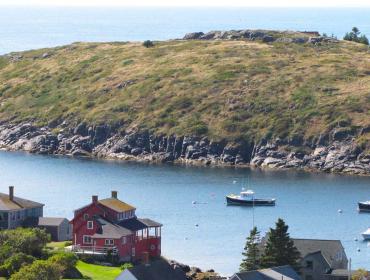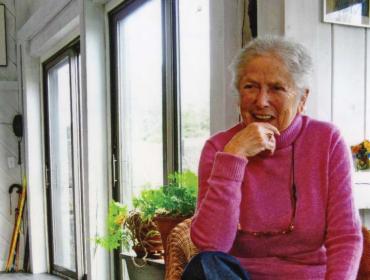Posted January 23, 2020
Last modified January 24, 2020
Editor’s note: The guest column published in the December/January issue—“Media is responsible for ‘eco anxiety,’” by Mark Preston—generated reader reaction ranging from outrage to support. For the record, the newspaper and its publisher, the Island Institute, believe climate change is human-induced, but we were willing to print an argument contrary to our views.
Crisis confirmed
To the editor:
Ideological media outlets have been pushing misinformation about science to unsuspecting people like the gentleman whose column “Media to blame for youth’s ‘eco anxiety’” appeared in your December/January issue, and unfortunately he has been misled by their foolishness.
Contrary to what he wrote, there is indeed a consensus amongst the vast majority of climate scientists, and it is based on hard evidence. My wife, a marine biologist, and I lived on a marine research station on the shore of the Irish Sea during the 1970s, and we knew then that the evidence was overwhelming and conclusive.
All the science since then has deepened our understanding and confirmed the urgency of the crisis. Changes in Earth’s climate caused by human activity are leading us toward environmental catastrophe, and society needs to take it seriously and act on it now. To do otherwise would be irresponsible.
David P. Lennox
Exeter, N.H.
Facts matter
To the editor:
I'm writing in response to Mark Preston's guest column in your December/January issue. Originally, I was tempted to dismiss it as just another hysterical missive from a right wing climate change denier. But in thinking more about it, I was reminded of former U.S. Sen. Daniel Patrick Moynihan's belief that “you are entitled to your own opinions, but you are not entitled to your own facts.”
Among other fantasies, Preston says global “warming is not backed by any scientific fact.” Well, here are some facts, from the 2019 annual report from the World Meteorological Organization meeting currently in Madrid:
- 2019 is on course to be the second- or third- warmest year on record
- average temperatures for the five-year (2015 to 2019) and ten-year (2010 to 2019) periods are almost certain to be the highest on record
- Arctic sea ice neared record lows in September and October of this year
- surges in sea temperatures known as "marine heat waves " have become more common
- the concentration of CO2 in the atmosphere hit a record level in 2018, and has continued to rise in 2019 (this traps heat in our atmosphere).
For those still not convinced, here's a statement from the Alliance of World Scientists, published in November 2019 in Bioscience, a peer-reviewed scientific journal: “Scientists have a moral obligation to clearly warn humanity of any catastrophic threat and to ‘tell it like it is.’ On the basis of this obligation and the graphical indicators presented below, we declare, with more than 11,000 scientist signatories from around the world, clearly and unequivocally that planet Earth is facing a climate emergency.”
So are you going to believe Mark Preston from South Bristol, or 11,000 scientists from around the world?
Preston talks about “eco anxiety” among young people, and accuses your publication, among many other sources, of brainwashing them. Well fortunately, they don't need to be brainwashed, because they are able and willing to find facts like the ones listed above. And as a result, activities like Fridays for the Future strikes have been happening around the world, with people from up to 150 countries taking part. My daughters, ages 22 and 21, are among them, since it is their generation and succeeding ones who will deal with the consequences of a warmer planet.
Whenever I'm asked by a politician or a pollster what my three biggest concerns are, my answer is always: Climate change, climate change, and climate change. There's nothing bigger, and nothing more pressing. It's for our kids, and our Earth.
Paul McGurren
Lincolnville
Shocked
To the editor:
As a teacher of environmental advocacy I was shocked that you published Mark Preston’s opinion piece. While he is right that fear tactics are counterproductive, and while it is good to publish a variety of opinions, the statement, “There is no scientific consensus on climate change” is not opinion. It is a bald-faced lie.
Scientists worldwide have studied air and water temperatures and climate events. They’ve independently tested hypotheses to see if the results are the same or different from similar studies. Through these studies, they’ve concluded unequivocally that the climate is warming. Their consensus is not a consensus of opinion or “propaganda” as Preston calls it, but it is a consensus of independent, scientific results.
I emphasize local experience in my classes. Even science skeptics can recognize the fact that Maine has had no shrimp season for the past three years, that ice-out on Maine lakes is significantly earlier than it was a century ago, and that Lyme disease is now endemic in Maine. A rock that was exposed at high tide in my childhood is now submerged.
Many are taking positive action to address climate change. The Environmental and Natural Resources Committee of the Legislature passed 30 new laws this spring. These laws passed with bi-partisan support.
Rather than publishing lies, arguing about scientific results, or stirring up fear, we need to continue to work towards public policies that help us be better stewards of the planet that sustains us.
Sue Inches
North Yarmouth
Not the point
To the editor:
This is a rebuttal to the guest column “Media is responsible for for eco-anxiety” by Mark Preston.
Preston notes that “the climate is always changing.” Yes, the climate is always changing, but that is not the point—what has been observed is that the climate has been warming for over a hundred years, and the science (goes back to Arrhenius, about 100 years ago) is quite definite that it is we who are warming the planet up (fossil fuels, CO2).
There is complete agreement on this point (not “consensus”) among scientists who have studied the issue. See Spencer Weart—history.aip.org/history/climate/index.htm—for more details.
Preston also writes that “It is clear that environmwental activism is a type of religion.” Environmental activism is not a religion, it is a rational response to observations about the state of the planet, and how that state is being altered by humans. The planet as a whole is an extremely complex coupled system, and there are people (hopefully, especially among the young) who recognize how that system can be vastly modified by relatively small tweaks; they exist, and they have been set off in the past, eg., ice ages—but externally. There weren’t enough of us then, but there are many more of us now, and we are changing the planet in visible and measurable ways.
Preston says “Warming is not backed by any scientific fact.” Really? There’s an immense amount of data that makes this statement ludicrous. Or just use your memory—Casco Bay used to freeze over every year less than a hundred years ago.
Jim Janak
Scarborough
Upside down thinking
To the editor:
It is interesting to read Mark Preston’s guest column and understand that he sees climate change as a belief system, a religion, and not based on scientific fact. This upside down thinking traces back to the creative, self-interested PR campaign started by moneyed interests who are deeply invested in preventing any regulation that reduces the causes of climate change. Their campaign has been slick and effective, as Mr. Preston’s column reveals.
Whenever there is such a disconnect in views, I like to look at the major government and financial institutions for any signs of a reaction or position. While it is extremely rare for a position on climate change to be disclosed, the responses to the threats of climate change have been uniform and sweeping across these institutions. They are all planning strategies to reduce or control the coming dangerous financial, national security and human impacts. They are not out in front trying to limit more damage; they are in survival mode determining how to cope with it. In other words, the major institutions in this country, and around the world, believe in the scientific position on climate change. That is why the children must be taught the facts and not the PR spin.
Scientists surely differ on their models of specific impacts and timing, but NASA reports that about 97% of active publishing scientists agree that human activity is the big driver of the global changes in the melting icecaps, sea level rises, mega storms, growing extinction of pollinators of food crops, dangerous air quality in places, and so on.
The U.S. military, financial institutions, insurance companies, and manufacturing companies have been accessing and preparing for the grave economic impact and dislocation from climate change, as well as the security risks it will cause globally. None of these institutions are known to act on beliefs/religion. They are fact driven, as their investors demand.
Climate change is a tough reality to accept because it will affect our children and grandchildren more than us. Blinders, though, will not stop it. Rejecting the consensus among the vast majority of the world’s top scientists will not stop it.
There is hyperbole and misinformation from each ‘side’ about this. Like everything else today, we citizens must take the time to wade through different mainstream sources to find the consensus without an economic gain behind it. Reading the U.S. Defense Department’s 2019 report declaring climate change a national security issue or reading a leading financial institution’s annual disclosure of risks to profitability would be a good start.
Maura Melley
South Thomaston
Right on target
To the editor:
Mark Preston’s guest column, “Media is responsible for ‘eco anxiety,’” which asserted “There is no scientific consensus on climate change” was right on target. The global-warming hysteria has gotten out of control. The “guess-timates” about this are absurd and are being promoted by people who know little about the climate and how it functions.
It is most unfortunate that Gov. Janet Mills is again wasting our tax money by having a 39-member climate change committee. Beware, climate change people will put whales before lobstermen and women. They will accomplish three things: increase our taxes, waste tax money, and give us dumb, unneeded regulations.
There always has been, and will be climate change. Man can do nothing about it. God created climate and he is in charge of it.
The real problem is that in the past, and currently, development has been too close to the water. To help alleviate problems, garbage dumping in the oceans must cease, development in ecological sensitive areas must stop completely, and wetlands must be preserved and enhanced.
Fred Hartman
Whiting
‘Lightly perused’
To the Editor:
Thank you for publishing the guest column written by Mark Preston on climate change. I agree with Mr. Preston wholeheartedly
This “fight” over climate change, who is responsible, and how to fix it has taken on a life of its own, and it isn't pleasant—fueled by
emotions, politics, and the media. I do not believe I am some lunatic Neanderthal, yet many would suggest I am. All because I have doubts about the whole climate change argument.
I read about it, and I see different takes on the whole “ocean rising—polar bears dying” arguments. Because I do, it would be easy for me to be shunned at any social gathering in this political demographic. Just because I have a different view.
Worse, I happen to not be a liberal! Gad. I take care of my property in a responsible manner. I even recycle and compost! I have owned a Prius (which, by the way, did not come with an Obama sticker on its gas cap door). And, I have driven little four-cylinder cars since I earned my driver's license. I am not ruining the universe! I am sure we as a people are affecting the Earth in some manner—how much, at what cost, and how we should react, are all valid arguments—without thinking one or another is an idiot.
I appreciate your organization, I read your paper, yet, I groan nowadays when it arrives. Even the lauded Phil Crossman has slipped politicization into his writing! Finally, a paper which has donated itself to the swept-up notion that we are all going to drown in 12 years has published an opposing view. Thank you for that! I will continue to lightly peruse your efforts before similarly disposing of my copy—or recycle it.
Rich Young
Tenants Harbor
‘Passing some smelly gas’
To the editor:
I do not know where Mr. Preston gets his definition of consensus, which according to Webster's dictionary means "wide agreement." There is wide agreement among scientists when a well-researched study presents evidence to support its theory.
There was wide agreement among scientists that cigarette smoking greatly increased one's risk of developing lung cancer and heart disease. Yet for years the tobacco industry vehemently denied it for as long as they could. While the evidence was overwhelming for decades, the tobacco industry continued to promote a fictional narrative of inconclusive science. And meanwhile those who smoked, for the most part, genuinely enjoyed smoking. They did not want government intrusion on their right to smoke. Only when the detrimental effects of second-hand smoke and the added costs of treating smokers’ diseases come to light did the evidence finally have impact.
Now there is wide agreement among the world's scientists that the use of fossil fuels is a major player in the current global climate crisis. I would encourage Mr. Preston to show us what is his evidence to the contrary that the current climate change crisis is not man-made. To say it has always happened throughout the life of the planet is like saying people have always died from lung cancer, so therefore smoking cigarettes doesn't cause lung cancer.
When someone silently passes some smelly gas in a crowd of people, when asked, it is often the practice of that person to deny it. The fossil fuel industry has passed some smelly gas and they are doing their best to make us believe they have nothing to do with it. In this case, not only is the fossil fuel industry denying the science, but also the users who are enjoying their rich fossil fuel diet.
Richard Hackel
Chebeague Island
‘Good cheer’
To the editor:
I congratulate The Working Waterfront for its inclusion of the columns of Sandy Oliver, Courtney Naliboff, and Barbara Fernald. I look forward each month to hearing about life on their islands as the year goes by, and their feelings about all kinds of subjects. Mostly I like their ways of seeing the world. Even though their lives are so different from mine, their humor, optimism, and good cheer make me happy.
Thank you.
Carolyn Jenks
Falmouth
Care and observe
To the editor:
“The Outer Bell” by Phil Crossman in the December/January issue really got to me. He views life as we all should. Pay attention. Think of others. Be mindful that there is so much more going in our world than us. Care. Observe. We all matter.
Thank you for a great read that I will frame and hang on the wall in our Peaks Island kitchen.
Ken Niemeyer
Fairhope, Alabama
Coyote is not your friend
To the editor:
The Eastern coyote is extinct and has been for more than 100 years (“Coyotes on Chebeague worry islanders,” November issue; “Coyotes are keystone carnivores, and play critical role,” December/January issue). The coyuote/wolf hybrid that now inhabits the eastern U.S. is an invasive species. He or she is not your friend. They will kill your pets, domestic animals, and maybe even you.
The coyote/wolf hybrid does not balance the ecosystem, but instead daily kills valuable game birds and animals kn the U.S., depriving sportsmen of game and the state of millions in lost revenue.
If you examine the spread of this coyote/wolf hybrid over the latter part of the 20th century and the spread of tick-borne diseases, they are identical.
Joseph M. Chase
Rockland
Contributed by




